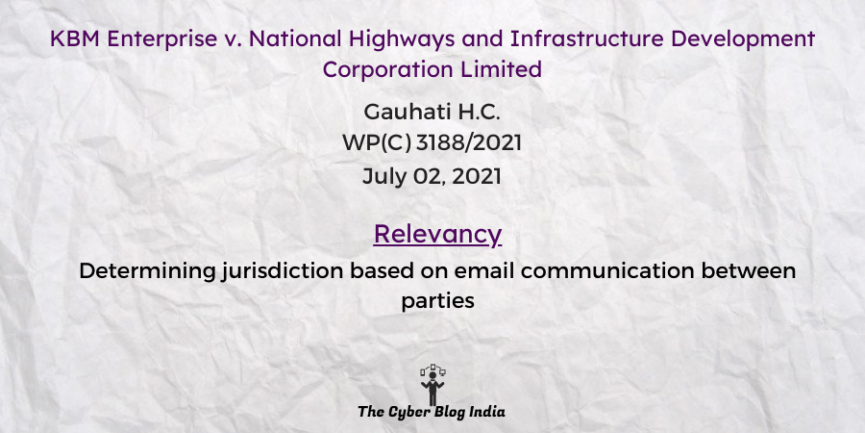KBM Enterprise v. National Highways and Infrastructure Development Corporation Limited

KBM Enterprise v. National Highways and Infrastructure Development Corporation Limited
AIR 2021 Gau 140
In the High Court of Gauhati
WP(C) 3188/2021
Before Justice Kalyan Rai Surana
Decided on July 02, 2021
Relevancy of the Case: Determining jurisdiction based on email communication between parties
Statutes and Provisions Involved
- The Information Technology Act, 2000 (Section 13)
- The Constitution of India, 1950 (Article 226)
Relevant Facts of the Case
- NHIDCL had issued a letter of acceptance (LoA) as the petitioner emerged as a successful bidder.
- However, due to Covid-19 restrictions in the state, the petitioner was not able to submit the necessary guarantee.
- Thereafter, the petitioner made a representation seeking an extension in the deadline. Subsequently, the respondents rejected these representations and withdrew the LoA.
- The petitioner filed this petition under Article 226 of the Constitution at the Gauhati High Court, based on the fact that the construction site was in the High Court jurisdiction.
- The Nagaland office of NHIDCL had sent an email rejecting the request made by the petitioner. In fact, this email is a cause of action in the present petition.
Prominent Arguments by the Advocates
- The petitioner’s counsel submitted that the respondent has one of its offices in Nagaland. Moreover, This is the location where the work is expected to be done. Hence, the Gauhati High Court has jurisdiction over this suit.
Opinion of the Bench
- Considering Section 13(5) of the Information Technology Act, 2000 and Order XXIX, Rule 2 of the Code of Civil Procedure, 1908, the principal place of business is the registered address of the company.
- Mere receipt of a Letter of Acceptance does not result in the formation of a contract. Also, the petitioner’s counsel has misapplied Section 13 of the Information Technology Act, 2000.
- Further, the cases relied on by the petitioner’s counsel for proving the territorial jurisdiction of this court are not an authority on the issue.
Final Decision
- The High Court of Delhi at New Delhi will be an appropriate forum for this issue.
Marc Pereira, an undergraduate student at Rizvi Law College, Mumbai, prepared this case summary during his internship with The Cyber Blog India in January/February 2022.
